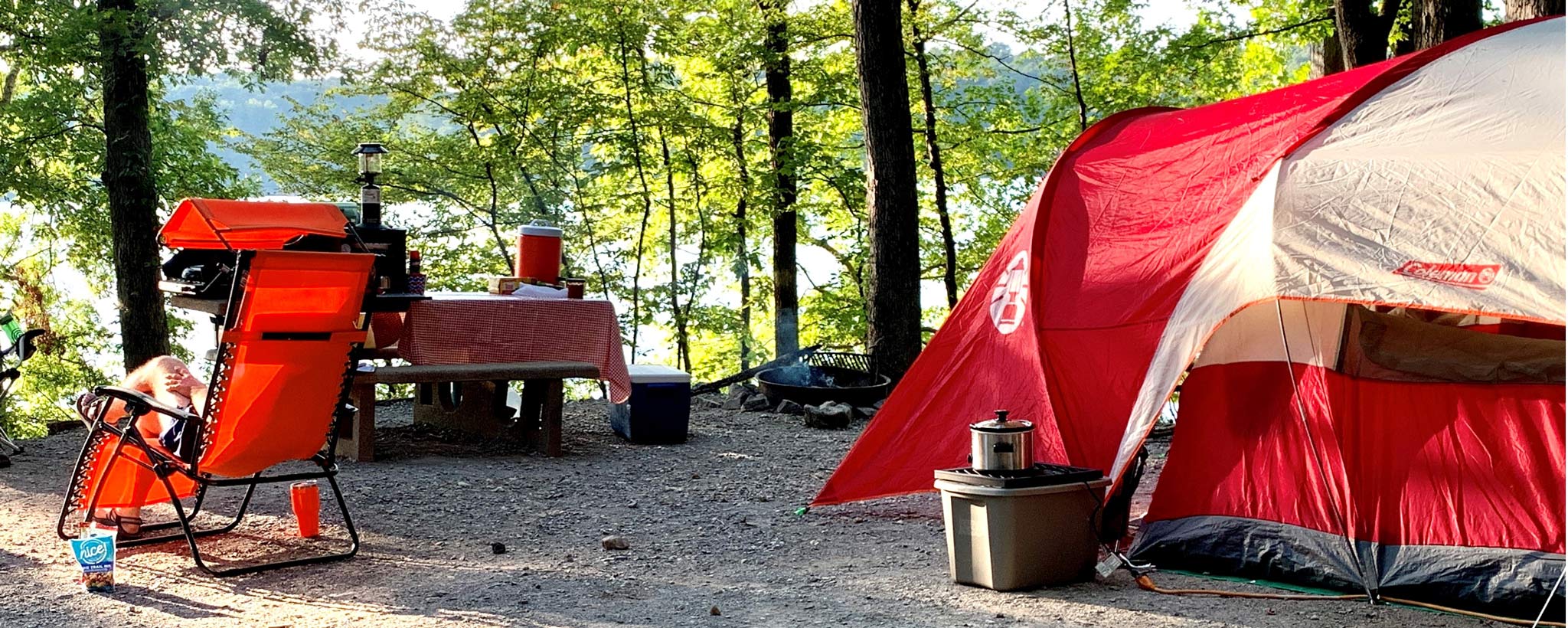
Certified Camp-Right Campgrounds Are Your Environmentally Friendly Option
Have you caught yourself daydreaming about the fresh smell of the forest or a perfectly toasted s’more? Chances are you’re overdue for a camping trip, but choosing a campground can be daunting. With hundreds of options across the Valley, many of them right on the water, how can you make an informed decision?
TVA’s list of Tennessee Valley Camp-Right Campgrounds can be one of your best camping resources because owners and managers who volunteer for this TVA initiative share a passion for protecting the environment.
One of the program’s primary objectives is to promote environmentally responsible campground management and camping practices on TVA land. Although that may sound easy, it’s a big undertaking that includes: Resource Conservation, Site Design and Maintenance, Waste Management and Public Education.
“However, instead of requiring massive changes, the program calls for numerous, small practices that make a vast difference over time. Consistency is the key to this initiative,” says RaSharon King, TVA watershed coordinator for the Tennessee Valley Camp-Right Campground program.
While each of the four sections is important, TVA has been a champion of Resource Conservation for decades, encouraging and promoting energy and water conservation, leave no trace principles, and wildlife enhancement.
Energy Conservation
Just like your home lighting, the best path to energy conservation is to replace incandescent bulbs with fluorescent or LED (light-emitting diode) lighting. Both last longer and are more energy-efficient than the old incandescent bulbs.
“Motion-sensor lighting, light-dependent sensors, and solar lighting also are important to Resource Conservation,” says Vicki Jo Valentine, TVA Natural Resources. “These should be installed on lights that are needed after dark. And don’t forget choosing EPA Energy Star rated appliances when it’s time to replace a piece of equipment.”
Water Conservation
Electricity isn’t the only resource that Camp-Right Campgrounds work to conserve. “Only 1% of the world’s water is freshwater, which makes it a precious commodity,” says King.
Some water conservation ideas are tried and true, like rain barrels and cisterns that capture rain runoff from roofs. Other methods include not allowing campers to wash their cars and boats at the campground and placing restrictions on watering.
Sometimes it’s not about restricting water, but rather water-saving technology. Faucet aerators, low-flow shower heads and low-flush toilets are great examples. “Lots of people don’t realize that older toilets can be retrofitted for low flow,” says King. “These suggestions can apply to homes as well as to campgrounds. Even something as simple as a garden hose nozzle can make a big difference over the course of the summer,” she says.
Leave No Trace
Along with conserving energy and water, Resource Conservation includes Leave No Trace practices, which educate outdoor enthusiasts about the impact of their recreational activities on the natural world.
The seven principles address: Planning Ahead and Preparing; Traveling and Camping on Durable Surfaces; Disposing of Waste Properly; Leaving What You Find; Minimizing Campfire Impacts; Respecting Wildlife; Being Considerate of Other Visitors.
At Camp-Right Campgrounds, examples include allowing fires only in fire rings and grills, avoiding the spread of non-native plants and animals, leaving natural and cultural features undisturbed during construction, and more. “These guidelines are relevant for campgrounds, backcountry camping and even around your house and property,” suggests King.
Wildlife Enhancement
“Supporting Wildlife Enhancement is the final Resource Conservation component, and it’s one of my favorites because it encourages owners and managers to more fully embrace the natural environment,” explains Valentine.
“Encouraging native wildflowers to support pollinators and installing nesting boxes for birds are actions we encourage, but for Camp-Right Campgrounds, it’s often about simply about leaving things alone,” she says. It may seem counterintuitive, but leaving a dead tree standing is advantageous for cavity-dwelling birds. Likewise, brush piles make great habitat for other wildlife.
“At TVA, we work to balance land use, human activity and conservation to achieve the greatest public benefit,” says TVA Director of Natural Resources Rebecca Hayden. “We applaud the owners and managers who have volunteered to become certified Camp-Right Campgrounds, and encourage campers to visit their campgrounds often.”
Find a list of certified campgrounds and a short slide show at Tennessee Valley CampRight Campgrounds.

It’s always a good time for fun on the Tennessee Valley’s lands and waters. Not sure where to start? We have you covered! Check out some of the best recreational activities on our reservoirs. While you’re enjoying the lakes, trails, picnic areas and campgrounds, share your own stories and photos on Instagram using #TVAfun.
River Neighbors Newsletter
Get the all the latest news and inside information about recreation on TVA public lands and lakes.